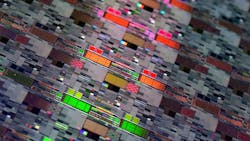Cirrus Logic to Co-Invest with GlobalFoundries in BCD Process Technology
Cirrus Logic announced it will expand its long-term partnership with GlobalFoundries to address demand for high-performance analog, power, and mixed-signal ICs in consumer, industrial, automotive, and other verticals.
Under the deal, the companies will collaborate to co-develop a next-generation BCD process. The BCD — short for Bipolar-CMOS-DMOS — technology enables digital, analog, and power blocks to be integrated on the same chip to improve power efficiency, reduce complexity, and save space. They said the BCD chips will be capable of being manufactured at GF’s main facility in Malta, New York. The effort will add a U.S.-based manufacturing option to GF’s existing production lines in Europe and Asia.
“We are excited to deepen our long-standing relationship with GlobalFoundries and help accelerate cutting-edge mixed-signal chip manufacturing to the U.S.,” said John Forsyth, CEO of Austin, Texas-based Cirrus Logic, a leading player in high-performance mixed-signal chips, primarily for audio.
He added, “This collaboration expands the technology leadership of both companies, strengthens the U.S. semiconductor supply chain, and reinforces our shared commitment to innovation and customer success.”
Trio of Process Technologies on One Die
BCD stands apart in the semiconductor landscape by integrating three different process technologies into the same silicon die, each fine-tuned for a different function:
- Bipolar transistors bring high-precision analog to the table to take care of sensitive signal-processing tasks.
- CMOS (complementary metal-oxide-semiconductor) enables high-speed digital logic and complex control circuitry to reside on the same chip.
- The DMOS (double-diffused metal-oxide-semiconductor) process is used primarily for high-voltage or high-power devices.
By co-locating analog, digital, and power blocks on the same slab of silicon, BCD reduces system complexity and silicon area while increasing power efficiency and reliability. It also incorporates robust isolation to shield high-performance analog circuits from noise induced by high-speed digital and high-voltage transistors. These are all important qualities for analog, power, and mixed-signal chips, including those designed by Cirrus Logic.
BCD is the de facto standard for a wide range of power-management ICs, including multiphase controllers, DC-DC converters, and voltage regulators used to manage high-performance chips in smartphones, laptops, and data centers. Furthermore, the technology underpins battery-management ICs that help maximize EV range and automotive display-driver ICs for dashboards. It’s also widely employed in high-performance analog signal-chain ICs used for sensing, control, and connectivity in industrial automation and motor-driver ICs for robots.
BCD isn’t close to competing with CMOS process technologies such as 3-nm and 5-nm in terms of transistor density. But it continues to be fertile ground for innovation in the analog and power domains.
GlobalFoundries’ most advanced BCD process is based on the 55-nm node. But the collaboration with Cirrus Logic could pave the way for scaling to smaller geometries, enabling a modular architecture that brings high-density digital logic, high-performance analog, and high-voltage power into the same chip.
Strengthening the Supply Chain
The new partnership will also support Cirrus Logic’s commitment to delivering mixed-signal products to its core markets while strengthening the resilience and geographic diversity of its customers’ electronics supply chains.
“This collaboration underscores the importance of resilient, geographically diverse supply chains for our industry,” added Tim Breen, CEO of GlobalFoundries, the largest U.S.-headquartered contract chipmaker.
Apple is one of Cirrus Logic’s largest customers, and it uses the company’s audio ICs in its iPad and iPhone products. The consumer electronics giant recently announced a $600 billion investment plan to realign more of its global supply chain to the U.S. As part of its new American Manufacturing Program (AMP), Apple said it intends to work with Texas Instruments, GlobalFoundries, TSMC, and other companies involved in the U.S. chipmaking ecosystem to create an end-to-end silicon supply chain on its home soil.
The effort comes as many electronic components are at risk of being hit by the Trump administration’s tariff-heavy trade policy, pressuring prices for smartphones and other goods. Electronics companies have been loading up on parts to avoid price hikes or potential shortages in the coming months, according to a report from Supplyframe. Trump has also threatened to impose tariffs of 100% or more on imported chips. However, he said companies manufacturing in the U.S. — or those that have committed to doing so — could be spared.
As a result, a number of electronics manufacturers and chipmakers are ramping up efforts to reshore their supply chains — both to guarantee a steady supply of key components and reduce the risk of price volatility.
About the Author
James Morra
Senior Editor
James Morra is the senior editor for Electronic Design, covering the semiconductor industry and new technology trends, with a focus on power electronics and power management. He also reports on the business behind electrical engineering, including the electronics supply chain. He joined Electronic Design in 2015 and is based in Chicago, Illinois.

